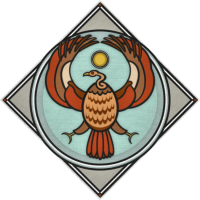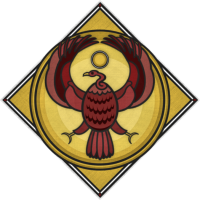Bledda was given the task of interrogating the captured Easterling warriors. Of the nine men guarding the outcrop above the stream that stood between the next Easterling plantation and Bledda's platoon, two had been killed outright and the rest captured. The vanquished enemies were removed of all weapons, bound hand and foot, and tied sitting with their backs against the four picket posts for horses. The captured warriors were too old, too young, or judging by the second man killed, too ill-recovered from some past injury as to be deemed useful by the warlords that ruled Dor-lómin for more important army posts. Had the goal not been to completely liberate all the people of long-subjugated Dor-lómin and remove any spies that could report back to the Enemy where and when the Army of the Valar was advancing, the elves might have bypassed the tiny watch-camp. As it were, the battle lasted only a third of the time it took to gather and bind the prisoners. Sending these prisoners to where they could be contained until the war was over would take even longer. Right now they were Bledda's problem.
As the elven scouts now knew what to expect in the immediate area, concerns with extracting information from the captured Easterlings factored less than explaining what their fate would be to the prisoners. The leaders of the great elven army from across the sea wished to save as many people from war-torn and sinking Beleriand, and the Valar in their infinite wisdom included former Easterling soldiers and slave masters in their assessment of who was to be saved. Bledda's feelings on the wisdom of that were ambivalent, and of their treatment. Elves were nothing like orcs; there would be no torture. That was the hardest part of Bledda's task, to convince the Easterling prisoners that they would not face what Bledda would have faced had their positions been reversed. This overgenerous mercy was not without limit. Any orcs that the elves came across in these dry foothills would be slain outright, but any surviving thralls were freed and sent to the Edain refugee camps with what rations could be spared. This empty corner of Dor-lómin held few surprises anymore after a week of scouting, and it was too remote and unimportant for orcs, but there were still enemy soldiers to be dealt with. This task of dealing with the prisoners was shoved onto Bledda, even though the elves or their Maia companion, an unnaturally large hawk perched on the captain's shoulder, could read minds and intentions.
The elven soldiers downplayed their mental abilities, and the avian Maia said it was only present for communication back to the front lines. Bledda had a strong working knowledge of the powers and limitations of elven magic. A year now he had been working with the Tenth Mountain Platoon, a company of golden-haired elves from across the sea who volunteered as one of the preliminary divisions to climb over the mountains into Dor-lómin. It was a decision Bledda did not regret, as he admired and liked the captain and the rest of the elves, and he desired above all to rescue the world from the Enemy. Still, learning to work with the elves from across the sea had not been initially easy. Mountaineering skills had been slow to learn, and Bledda had little proficiency with the elves' long spears. How the Maia who attached himself to the platoon was only visible sometimes as a talking wren or hawk or even just a hazy cloud of heat shimmers took Bledda a week before he no longer screeched in alarm when the Maia appeared. Fighting orcs alongside these elves took some adjustment, but not as much as how the golden-haired elves gave orders. Bledda grew used to commands sent via thought. Disorienting at first, it had the advantage of not carrying across the high passes and alpine gorges. And during the initial months when Bledda struggled to learn back-country Quendya, which even the captain admitted was a dialect strange and rustic to that of Valmar, their communication depended on the ease through which thoughts could dilute barriers, as the elves were also in the process of learning Sindarin and as many of the Mannish tongues as Bledda could speak. Nowadays the elves spoke the languages of Beleriand even among themselves. Still, the elves could not read minds easily or without invitation, and Bledda was the only one with a vocabulary over hundred when it came to the language of the Easterling tribes in cold and stony Dor-lómin. One of the languages, at least, for Bledda was of the Bór, one of its last descendants, and the people that conquered Dor-lómin were of Ulfang and his allied tribes. But the mortal was here, and he was the one sent to inform the newly captured prisoners of their fate. Grumbling about lazy elves and lazier Maia who liked to pretend to be a bird but never one useful like a Great Eagle, and how a translator wasn’t as necessary as they assured, Bledda stomped over to the pickets.
Bledda knew the real reason he was sent to parlay with any captured Easterlings was because he was the lone mortal present -if one did not count his wife Rúth, who waited back in camp copying and updating maps to send back to the regular divisions with their messenger Maia. Moreover, he looked superficially like the captured Easterling warriors, and the elves felt he was less intimidating of a face. The captured human warriors all flinched from the bright eyes of the elves, but looked upon Bledda with confusion and scorn. They called him traitor, when they addressed him at all.
The Easterling warriors captured after battle did not understand who Bledda was or why he sided with the elves. Perhaps if he had a yellow beard or carried a great ax, they would know him as an Edain warrior. Bledda knew he would never be mistaken for one of the three tribes of the Edain, not even of the Bëor. He was Easterling- and not. The prisoners knew he was not one of theirs; Bledda could see it in the calculation of their eyes as they noticed the small ways in which he was as foreign to Dor-lómin as the elves from across the sea. Bledda was smooth-cheeked, wore his hair in two plaits, fastened his tunic on the wrong side, had the wrong style of knife tucked into his belt, and wore loose trousers tucked into boots that did not turn up at the toe. He stuttered through unfamiliar names and did not know the location of each homestead. He would ask, halting over loan words and obsolete terms, who was aligned to which banner. Worst of all, he glanced up when he swore by the Great Blue Sky. The oldest of the prisoners would catch on, would smirk and use another word for traitor, for lost tribe, would spat the word for Bór.
They noticed the vulture alongside the eagle on Bledda’s belt and embossed on the heirloom barding of his horse. Bledda wanted them to. He regretted that he did not have the war banner that belonged to his ancestors, or he would have flown the forgotten emblem of Bór beneath the white and gold of the elves. But the red and gold birds and the black horsehair were lost in the Fifth Battle.
Bledda stood in front of the bound prisoners and let his indignation and pride overwhelm the sensation that whispered he was a fraud. The old stories spoke of changeling children, poor substitutes created by either elven magic or the Enemy's shape-shifters pretending to be men, ghosts walking among the living to lead warriors into traps. Bledda knew which side the guilt should be felt. He would feel not lesser than men that served alongside orcs and had tried to wipe out his people.
One of the older prisoners this time, a bandy-legged man who did not fight when the elven platoon overpowered the Easterling sentry camp, laughed when Bledda began his speech pre-written by the captain. Only two sentences into those worn statements of where the prisoners would be sent was honestly further into the diatribe than the young man expected. Bledda had not even reached the promises of fair treatment and food, deserved or not, for he had seen of what was done to the conquered people of Dor-lómin and how the orcs and wargs roamed free. “You are a ghost,” the old man said, and Bledda grimaced. He expected this, once the prisoners noticed the vulture. The Bór should have been exterminated, according to Uldor’s men. The prisoners looked upon Bledda’s golden vulture as a corpse raised and walking, an unnatural betrayal of death. That he or any tribesman of Bór lived at all was somehow worse than the young man's decision to follow elven soldiers.
“Aye,” Bledda sighed, weary and angry and tired of being judged by cruel and defeated men, “I am Bledda, son of Ernath, of the People of Bór.”
“Son of Kreka,” said the old man.
Bledda stopped cold. “How do you know that name, old man? I was born a long way from here. I have never served your wretched master, nor my mother, and she has never stepped foot in this land.”
The old man smiled, smug or fond or wistful, Bledda could not tell. The other prisoners stared at the old man in similar confusion. “Bledda, son of Kreka, daughter of Marti, the daughter of Borthand, the son of Bór." Names rolled off the old man's tongue with graceful ease. "Bór of the Great Soul,” the old man said with a reverence which astonished everyone, spoken the way Bledda's mother spoke of their ancestor or the way the elves would call out the name of the Star-kindler. “I know your mother, knew her very well. I knew you, little Bledda. Or at least those giant ears. Ernath was many things, but never as good a listener as you’d think he should have been with such ears,” laughed the old man, as all the other prisoners inched away as much as the limits of their bonds allowed. Bledda thought once more of the stories of changelings, of ghosts walking once more among men. “I am Ruga, son of Roas. Elder brother of Kreka. Your uncle.”
Ever since I mentioned Kreka's brother in the very first story about the survivors of the people of Bór, I knew I wanted to go back and answer what happened to him (it involved this reunion and the Middle-earth equivalent of the Underground Railroad).
The Tenth Mountain Platoon is another bunch of mostly Vanyar OCs, including their fussy captain, who someday I'll write out the whole story, a good deal of which would involve Bortë, the First Queen of Numenor, as the regiment's collective adopted niece. (For those tracking the ASoIaF fusion characters, he's Lissë's son).
At least some Vanyar spoke a more archaic form of Quenya (Quendya).




